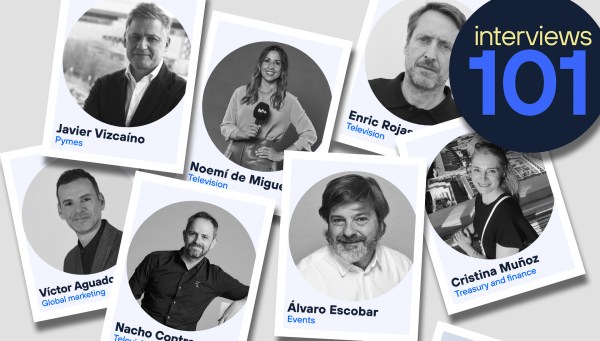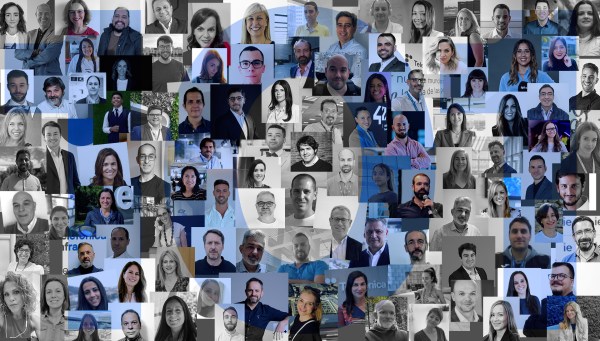Tell us a little about yourself. What does your job at Telefónica involve?
I am the Director of Sector Solutions and Energy at Telefónica. I was born in Argentina and have been living in Spain for 20 years, half of which I spent working in strategic consulting at BCG and the other half as an executive at AstraZeneca. I joined Telefónica in 2022 and today my job is to lead innovative projects that integrate advanced technology to improve efficiency and sustainability in the Energy, Industry, and Health and Social sectors.
Although better known as a telecommunications operator, Telefónica is also one of Spain’s largest technology providers. Our evolution stems from the trend toward convergence between the worlds of communications and technology. Building on our position in connectivity, we have been putting technology at the service of society for years, helping to digitize different services and industrial sectors.
Something similar is happening in industry, where the IT and OT worlds are beginning to merge. In this context, the multidisciplinary teams I coordinate provide our customers with comprehensive technology solutions tailored to the specific challenges of each sector.
Based on our CORE products, such as connectivity, IoT, Big Data, and Cybersecurity, we develop and implement value propositions that address the business needs of each sector. This enables us to provide end-to-end solutions from a single company, allowing our customers to optimize their processes and digital transformation.
Our goal is to become leading integrators in our focus sectors. To achieve this, I have a team of true experts who speak the same business language as our customers, enabling them to understand their challenges and address them with the best technological solution. Another aspect that I consider to be a differentiating factor is the incorporation of user experience (UX) and innovation when defining and designing our value propositions, which is key to making an effective and real impact. Finally, when it is necessary to implement solutions with partners, we only work with the best, as evidenced by our recent agreement with Siemens to promote industrial digitalization.
How can digital transformation impact the world of healthcare in general?
The population is aging, chronic diseases are on the rise, there is a growing shortage of medical personnel, and the costs of personalized treatments are increasing. These ingredients are driving our healthcare system toward a perfect storm.
In this context, digital transformation is a necessity that enables the economic sustainability of the sector, making it more efficient without losing performance and ensuring higher quality patient care.
Digitization is revolutionizing the world of healthcare by improving diagnostic accuracy, facilitating access to medical care, and personalizing treatments. Technologies such as artificial intelligence and big data allow large volumes of information to be analyzed, for example in data spaces, to identify patterns and trends, which can lead to more preventive and predictive medicine.
And in the hospital setting in particular?
In this environment, digital transformation translates into optimized hospital resource management, significantly improved communication between healthcare professionals and patients, and an exponential increase in operational efficiency.
For example, we have solutions on the market for remote patient monitoring. These solutions use connected medical devices to facilitate the collection of information from chronic patients in their homes, without the need for transfers. This allows us to monitor patients efficiently, both for the patient and for healthcare professionals, reducing the existing overload on the system.
In the healthcare field, it is also very interesting to see how technology enhances the quality of care provided by professionals. The implementation of virtual assistants, based on artificial intelligence, allows for the automatic generation of medical reports, prescriptions, or follow-up appointments mentioned during consultations. This allows doctors to focus on the patient, leaving administrative tasks to AI agents.
What can technology do to combat unwanted loneliness?
Technology is a powerful tool for combating unwanted loneliness, which is an endemic problem affecting the elderly population. In Spain, almost a third of the two million people over the age of 65 who live alone suffer from unwanted loneliness.
Communication platforms, social networks, and wellness apps can connect people, offering emotional support and creating virtual communities. And while adopting technology can be a challenge for older adults, we use devices they are already familiar with to provide this support.
Television, for example, is a very familiar channel that can be used to bring technology closer to older people. There are solutions on the market that allow us to connect video calls from family members or social workers, as well as messages about social activities organized by communities and local councils.
Other useful tools include virtual assistants and smart devices that can identify signs of loneliness and provide companionship and assistance to older people or those with reduced mobility. In my case, I have a close example of an elderly aunt who is blind due to diabetes, whose virtual assistant is helping her a lot to stay connected to the world and access different forms of entertainment (audiobooks, music, etc.).
Digital transformation is not only impacting the healthcare sector. How can the industry evolve thanks to the development of new technologies?
The industry can evolve towards greater automation, efficiency, and sustainability thanks to the development of new technologies. Artificial Intelligence, the Internet of Things (IoT), and robotics, among others, are transforming manufacturing, logistics, and resource management. These technologies enable more flexible production, more accurate inventory management, and reduced energy consumption.
A specific example is the value proposition for port authorities. Ports face numerous challenges, such as ensuring environmental and energy sustainability while offering the best experience to individual and business customers and operating efficiently.
In this evolution towards the smart port of the future, Telefónica has the tools to support this transformation. Process digitization, asset traceability, infrastructure management, energy efficiency, and physical and digital security in the port, integrated into a platform that enables real-time data capture, processing, and analysis, are key to addressing the challenges of this sector in an integrated manner.
How does data generation in industrial processes affect the industrial sector?
Data generation in industrial processes enables more informed, objective, and accurate decision-making. The data collected can be analyzed to identify areas for improvement, predict machinery failures, and optimize the supply chain. This results in greater operational efficiency, reduced costs, and improved product quality.
In the next five years, data, the result of hyperconnectivity, together with robotization, will be the major drivers of change in industry. The former enables the digitization of processes and the latter a new wave of automation. Behind all this is AI and its knowledge models and a major innovation that will bring with it jobs requiring very different skills. We will have to learn to coexist in our industries with these collaborative robots that make intensive use of knowledge models.
These technologies will be responsible for competitiveness, productivity, and the next wave of scalability in industry. Reindustrializing in this way will be the only way to respond to the challenges we face and compete with other regions.
What tangible examples can consumers see thanks to these technological advances in industry?
From the consumer’s point of view, data means traceability and therefore transparency and quality guarantees. In Europe, for example, the digital passport directive will soon be approved, which will be a tool for electronically recording, processing, and sharing information related to sustainability in industrial sectors such as electronics, textiles, footwear, batteries, metals, and construction.
This traceability is something we now demand as consumers in the food and pharmaceutical sectors. All these industries will therefore be forced to evolve towards a complex model of data exchange throughout their value chain. This will enable consumers to enjoy higher quality products with faster delivery times and greater transparency in the supply chain.
Which Telefónica employees would you nominate for this interview because you consider them to be excellent at their job?
It would be very interesting to interview Elena Gil, Director of Telefónica Tech, who is leading Telefónica’s efforts in Big Data and Artificial Intelligence, to learn first-hand about the revolution that is taking place in this field and how we are addressing it at Telefónica.







